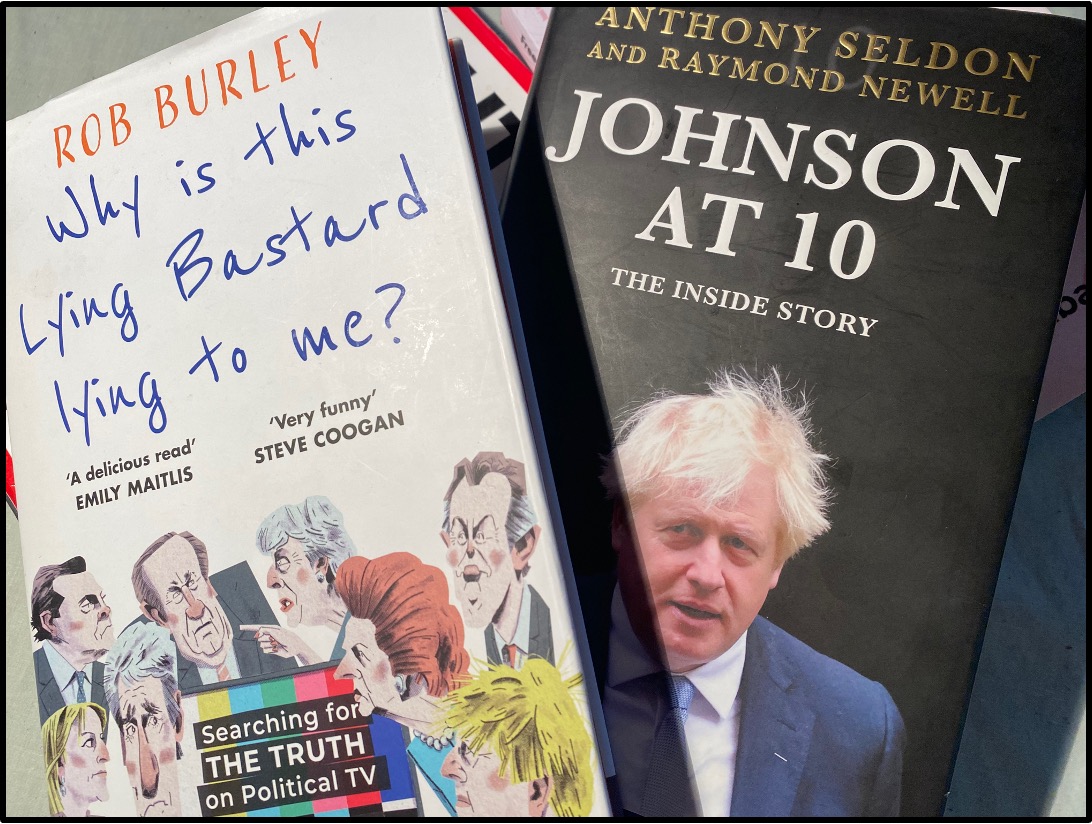This is Blog No 39
Rob Burley believes passionately in the long-form political interview.
That’s why he worked with some of the best that have ever been – from Brian Walden to Jeremy Paxman, Andrew Marr and Andrew Neil. He was deputy editor of the BBC’s flagship ‘Newsnight’ and before leaving the Corporation in 2021, was Head of Political Programming.

I have just read his hugely entertaining book “Why is this Lying Bastard lying to me?” – a volume that betrays a deep understanding of the complexities and subtleties of the genre – in contrast to the rather crude title – that isn’t his anyway!
For those of us who are interested in the issues and personalities that define our democracy, what’s not to like about subjecting the great and the good to a measure of accountability for their beliefs and actions? Rob Burley sees it as the core mission of journalism - to help citizens understand what our leaders think, and to press them to explain their decisions. He uses well-known examples
- Brian Walden, a long-time admirer of Margaret Thatcher, ultimately dismantling the arrogance of her late Premiership, as she pretended she had not forced Nigel Lawson out of the Chancellorship
- Andrew Neil forcing David Cameron to admit how little he had achieved in the renegotiation of EU terms before the 2016 Referendum
- The same interviewer challenging Theresa May that ‘nothing has changed’ when her social care manifesto commitment imploded in 2017
- The Newsnight interview where Paxman asked Michael Howard the same question twelve times – over the improper sacking of a Prison Governor …
- The interview that never took pace - when Boris Johnson declined to be grilled during the 2019 election, after Corbyn had been eviscerated over the antisemitism issue the previous week.
In other words, plenty of fascinating, often-amusing holiday reading for us political buffs.
But underlying it is a real issue over the health and wellbeing of our democratic politics.
For Burley worries about the retreat from detailed political cross-examination in favour of short and superficial soundbites. So do I. Burley does not use the phrase ‘dumbing down of politics’ but when Elizabeth Gammell and I published The Politics of Consultation, we found it absolutely the right way to describe what’s happening, and to explain the ever-increasing importance of public consultation.
Both processes rely upon an assumption that the public has a right to know the truth. We can no longer take this for granted. We now understand what is meant by misinformation; we are familiar with the need for ‘fact-checking’ and we accept that there are a small number of security-sensitive or market-sensitive issues where complete candour is less likely. What is NOT acceptable is state-sponsored or state-tolerated lying.
Reading Sir Anthony Seldon’s magisterial tome “Johnson At 10”, it is impossible to escape the conclusion that, as Prime Minister, Boris Johnson repeatedly and consistently failed to tell the truth. Seldon claims he misled friends and colleagues with equal facility; he deceived serious stakeholders over such mistakes as the Northern Ireland protocol, the non-existing plan for social care and assumptions about immigration figures. Neither is this malaise the exclusive province of one party. Jeremy Corbyn’s denials of Labour antisemitism do not read well either.
Conventional wisdom is that the truth eventually emerges anyway. How? Through public inquiries, Select Committee sessions, National Audit office investigations and of course journalistic research. But learning the facts months and years after the event is a poor substitute for more open, transparent policy-making in the first place. Consultation is an important way to do this.
Obliging decision-makers to explain the policy background, to outline options, to publish impact assessments and then to consult on such aspects as are open to influence may not be foolproof but they are valuable safeguards. Add to this, the requirement to publish Output and Outcome reports that could, if necessary be challenged in the Courts – and consultations are an important element of checks and balances.
As Rob Burley would, hopefully agree, getting to the heart of difficult issues through the traditional interview requires skilled and knowledgeable interrogators; anything less and media-trained politicians find it easy to avoid difficult questions. Diversion and deflection is routine. With consultation, however, evasion is more difficult. You can’t end up in the High Court for dodging a question on the TODAY programme. But publish misleading information in a public consultation – and well-informed stakeholders will surely seize upon it and if they wish, mount a legal challenge.
Our speedy but superficial coverage of politics IS dumbing down much of the public discourse. We need both the long-form interview – and a standards-driven culture of public consultation as key checks and balances to ensure good and transparent governance.
Rhion H Jones LL.B
See Rhion's speeches etc
For More like this - free of charge: now click here
Leave a Comment
I hope you enjoyed this post. If you would like to, please leave a comment below.